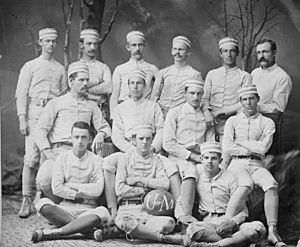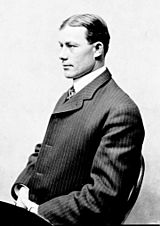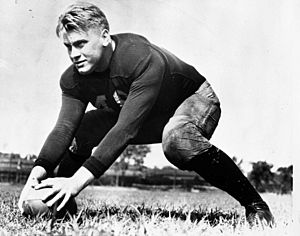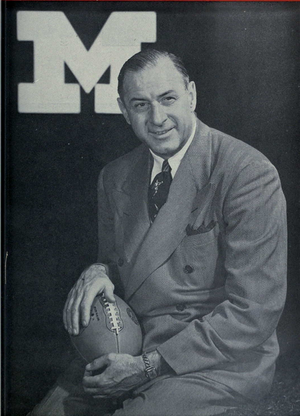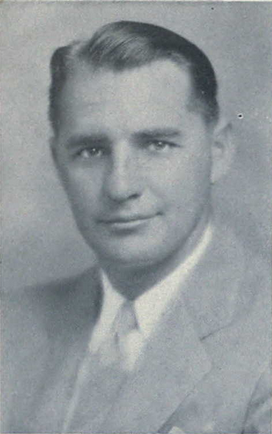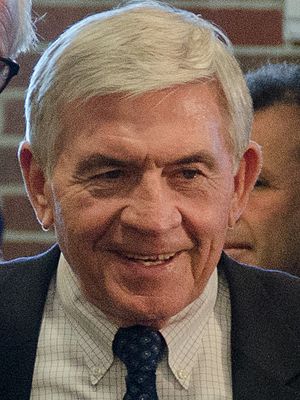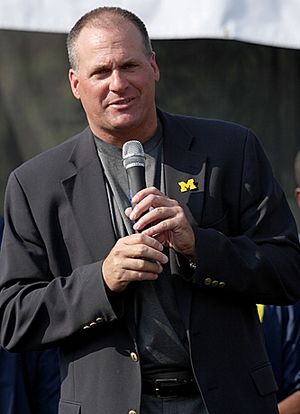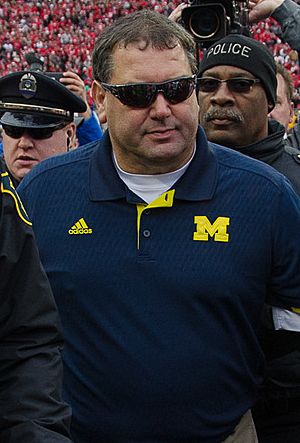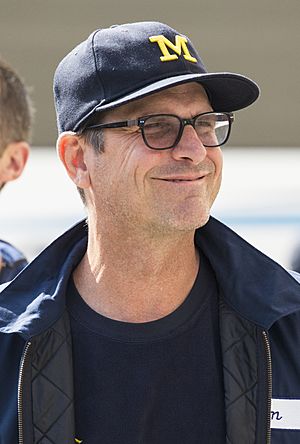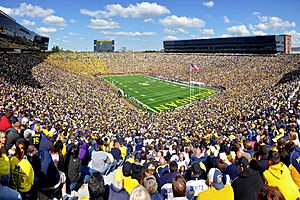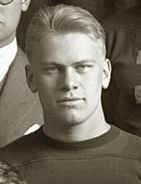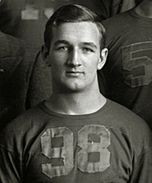Michigan Wolverines football facts for kids
Quick facts for kids Michigan Wolverines football |
|||
|---|---|---|---|
|
|||
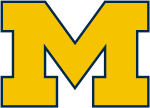 |
|||
| First season | 1879; 147 years ago | ||
| Athletic director | Warde Manuel | ||
| Head coach | Sherrone Moore 2nd season, 9–5 (.643) |
||
| Stadium | Michigan Stadium (capacity: 107,601) |
||
| Year built | 1927 | ||
| Field surface | FieldTurf | ||
| Location | Ann Arbor, Michigan | ||
| NCAA division | Division I FBS | ||
| Conference | Big Ten Conference | ||
| All-time record | 1,012–358–36 (.733) | ||
| Bowl record | 24–29 (.453) | ||
| Playoff appearances | 3 (2021, 2022, 2023) | ||
| Playoff record | 2–2 | ||
| Claimed national titles | 12 (1901, 1902, 1903, 1904, 1918, 1923, 1932, 1933, 1947, 1948, 1997, 2023) | ||
| Unclaimed national titles | 7 (1910, 1925, 1926, 1964, 1973, 1976, 1985) | ||
| National finalist | 1 (2023) | ||
| Conference titles | 45 | ||
| Division titles | 4 (2018, 2021, 2022, 2023) | ||
| Rivalries | Ohio State (rivalry) Michigan State (rivalry) Minnesota (rivalry) Notre Dame (rivalry) Penn State (rivalry) Northwestern (rivalry) |
||
| Heisman winners | Tom Harmon – 1940 Desmond Howard – 1991 Charles Woodson – 1997 |
||
| Consensus All-Americans | 89 | ||
| Current uniform | |||
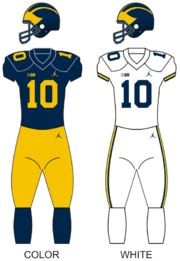 |
|||
| Colors | Maize and Blue |
||
| Fight song | "The Victors" | ||
| Marching band | Michigan Marching Band | ||
| Outfitter | Jordan Brand | ||
The Michigan Wolverines football team plays for the University of Michigan in college football. They compete at the highest level of college football, the NCAA Division I Football Bowl Subdivision. Michigan holds the record for the most all-time wins in college football history.
The team is famous for its unique winged helmet, its exciting fight song, and huge crowds at Michigan Stadium. They also have many rivalries, especially their yearly game against Ohio State, known as "The Game." This rivalry was once called the best sports rivalry by ESPN.
Contents
- Team History
- Early Years (1879–1900)
- The Yost Era (1901–1928)
- Kipke Years (1929–1937)
- Crisler Years (1938–1947)
- Oosterbaan Years (1948–1958)
- Schembechler Era (1969–1989)
- Moeller Years (1990–1994)
- Carr Years (1995–2007)
- Rodriguez Years (2008–2010)
- Hoke Years (2011–2014)
- Harbaugh Years (2015–2023)
- Moore Years (2024–Present)
- Conference Affiliations
- Bowl Games
- Home Stadiums
- Team Rivalries
- Championships
- Team Records and Achievements
- Individual Awards and Honors
- Images for kids
Team History
Michigan started playing football in 1879. They joined the Big Ten Conference in 1896 and have been a member ever since, except for a break from 1907 to 1916. Michigan has won or shared 45 league titles. Since the AP poll began in 1936, they have finished in the top ten 39 times. The Wolverines claim twelve national championships. This includes three recent titles from major polls in 1948, 1997, and 2023.
Early Years (1879–1900)
Michigan played its first college football game on May 30, 1879. It was against Racine College in Chicago. In 1881, Michigan played Harvard in Boston, which was a big step for college football. In 1887, Michigan players visited South Bend, Indiana and taught football to students at the University of Notre Dame. This led to the start of the Notre Dame Fighting Irish football program and the rivalry between the two schools.
In 1894, Michigan beat Cornell. This was the first time a team from the western U.S. defeated a strong eastern team. In 1896, the Western Conference (now the Big Ten Conference) was formed. Michigan won its first conference championship in 1898 by beating Chicago 12–11. This exciting win inspired the school's fight song, "The Victors."
The Yost Era (1901–1928)
In 1901, Fielding H. Yost became Michigan's head coach. His teams were known as the "Point-a-Minute" squads because they scored so many points. From 1901 to 1905, they went 56 games without a loss. This included a big win in the 1902 Rose Bowl, which was the first college football bowl game ever played. In that game, Neil Snow scored five touchdowns, a Rose Bowl record that still stands.
In 1903, Michigan played Minnesota, starting the rivalry for the Little Brown Jug. This is the oldest rivalry trophy in college football. Yost's teams won many conference and national championships. He also helped build Michigan Stadium, which opened in 1927.
Kipke Years (1929–1937)
Harry Kipke, a former Michigan player, became head coach in 1929. From 1930 to 1933, Michigan won the Big Ten title every year and two national championships in 1932 and 1933. During this time, the team featured Harry Newman, who was named the best college player of the year.
A notable moment happened in 1934 during a game against Georgia Tech. Michigan player Willis Ward, who was African-American, was not allowed to play by the opposing coach. This incident reportedly made Michigan player Gerald R. Ford, who later became the 38th president of the United States, consider leaving the team.
Crisler Years (1938–1947)
In 1938, Fritz Crisler became Michigan's coach. He brought the famous winged football helmet design from Princeton University. This helmet has become a symbol of Michigan football. In 1940, Tom Harmon won the Heisman Trophy, an award for the most outstanding college football player.
Crisler also changed how football was played. In 1945, he divided his team into "offensive" and "defensive" groups. This idea, called "two-platoon football," helped shape modern football. In his final season in 1947, Crisler's team, nicknamed the "Mad Magicians," won a national title and beat USC 49–0 in the 1948 Rose Bowl.
Oosterbaan Years (1948–1958)
Bennie Oosterbaan, a former Michigan star, took over as coach in 1948. His first team in 1948 went undefeated and won another national championship. In 1950, Michigan won the "Snow Bowl" against Ohio State 9–3, earning a trip to the 1951 Rose Bowl.
Schembechler Era (1969–1989)
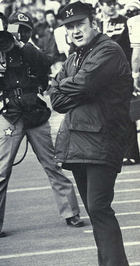
In 1969, Bo Schembechler became Michigan's coach. His first team upset No. 1 Ohio State 24–12. This started "The Ten Year War," a fierce rivalry between Schembechler's Michigan and Woody Hayes' Ohio State. For ten years, one of these two teams won or shared the Big Ten title every season.
Schembechler led Michigan to an undefeated regular season in 1971. From 1976 to 1978, Michigan beat Ohio State three years in a row and went to the Rose Bowl each time. Schembechler coached for 21 seasons, winning 13 Big Ten titles and 194 games, a program record.
Moeller Years (1990–1994)
Gary Moeller took over from Schembechler in 1990. His teams won the Big Ten championship in 1991 and 1992. In 1991, Desmond Howard had an amazing season and won the Heisman Trophy. The 1992 team, led by quarterback Elvis Grbac, went undefeated and tied three games, then won the 1993 Rose Bowl. Moeller left the program after the 1994 season.
Carr Years (1995–2007)
Lloyd Carr, a longtime Michigan assistant, became head coach in 1995. In 1997, his team, led by star player Charles Woodson, went undefeated. The defense was incredibly strong, allowing only 9.5 points per game. Michigan finished No. 1 in the AP Poll, winning its first national championship since 1948 with a victory in the 1998 Rose Bowl. Charles Woodson also won the Heisman Trophy that year.
With Tom Brady as quarterback, Michigan won the Big Ten again in 1998. Carr's teams continued to be strong, winning more Big Ten titles in 2000, 2003, and 2004. In 2003, Chris Perry won the Doak Walker Award as the nation's best running back.
In 2006, Michigan started 11–0 and was ranked No. 2 before playing No. 1 Ohio State in a game called the "Game of the Century." Ohio State won a close game 42–39. Carr retired after the 2007 season, finishing with 122 wins, five Big Ten championships, and one national championship.
Rodriguez Years (2008–2010)
After Carr, Rich Rodriguez became head coach. He brought a new style of offense called the "spread offense." The team faced challenges, and the 2008 season was Michigan's first losing season since 1967. They also missed a bowl game for the first time since 1974. Rodriguez left the program after the 2010 season.
Hoke Years (2011–2014)
Brady Hoke became head coach in 2011. In his first season, he led the Wolverines to 11 wins, including a dramatic comeback victory over Notre Dame in Michigan's first night game at Michigan Stadium. They also beat Ohio State for the first time in eight years. Michigan won the 2012 Sugar Bowl, their first bowl win since 2007. In 2012, Michigan achieved its 900th program win, becoming the first college football team to reach this milestone. Hoke left the program after the 2014 season.
Harbaugh Years (2015–2023)
On December 30, 2014, former Michigan quarterback Jim Harbaugh returned to his alma mater as head coach. Harbaugh quickly turned the team around. In his first season in 2015, Michigan finished with a 10–3 record, including a big win in the Citrus Bowl.
Under Harbaugh, Michigan consistently ranked among the top teams. They won three straight Big Ten championships from 2021 to 2023. They also made it to the College Football Playoff three times in a row. The 2023 team had an incredible season, going undefeated with 15 wins and zero losses. They beat Alabama in the 2024 Rose Bowl and then defeated Washington in the National Championship Game. This marked Michigan's first national championship since 1997. After this historic victory, Harbaugh left Michigan to coach in the National Football League (NFL).
Moore Years (2024–Present)
On January 26, 2024, Sherrone Moore was named Michigan's 21st head football coach. He is the first African American head coach for the program. In his first season, Moore led the Wolverines to an 8–5 record. This included wins over rivals Michigan State and Ohio State. The victory against Ohio State was a big upset, as Michigan was not expected to win. Moore also won his first postseason game, beating Alabama in the ReliaQuest Bowl. Michigan became the only program to beat Alabama twice in the same calendar year.
Conference Affiliations
Michigan has been part of different conferences throughout its history:
- Independent (1879–1891)
- Intercollegiate Athletic Association of the Northwest (1892–1893)
- Independent (1894–1895)
- Western Conference (1896–1906)
- Independent (1907–1916)
- Big Ten Conference (1917–present)
Bowl Games
Michigan has played in 53 bowl games, winning 24 of them. Before 2008, Michigan had a streak of playing in a bowl game for 33 years in a row.
| Date | Bowl | Opponent | Result |
|---|---|---|---|
| January 1, 1902 | Rose Bowl | Stanford | W 49–0 |
| January 1, 1948 | Rose Bowl | USC | W 49–0 |
| January 1, 1951 | Rose Bowl | California | W 14–6 |
| January 1, 1965 | Rose Bowl | Oregon State | W 34–7 |
| January 1, 1970 | Rose Bowl | USC | L 3–10 |
| January 1, 1972 | Rose Bowl | Stanford | L 12–13 |
| January 1, 1976 | Orange Bowl | Oklahoma | L 6–14 |
| January 1, 1977 | Rose Bowl | USC | L 6–14 |
| January 2, 1978 | Rose Bowl | Washington | L 20–27 |
| January 1, 1979 | Rose Bowl | USC | L 10–17 |
| December 28, 1979 | Gator Bowl | North Carolina | L 15–17 |
| January 1, 1981 | Rose Bowl | Washington | W 23–6 |
| December 31, 1981 | Bluebonnet Bowl | UCLA | W 33–14 |
| January 1, 1983 | Rose Bowl | UCLA | L 14–24 |
| January 2, 1984 | Sugar Bowl | Auburn | L 7–9 |
| December 21, 1984 | Holiday Bowl | BYU | L 17–24 |
| January 1, 1986 | Fiesta Bowl | Nebraska | W 27–23 |
| January 1, 1987 | Rose Bowl | Arizona State | L 15–22 |
| January 2, 1988 | Hall of Fame Bowl | Alabama | W 28–24 |
| January 2, 1989 | Rose Bowl | USC | W 22–14 |
| January 1, 1990 | Rose Bowl | USC | L 10–17 |
| January 1, 1991 | Gator Bowl | Ole Miss | W 35–3 |
| January 1, 1992 | Rose Bowl | Washington | L 14–34 |
| January 1, 1993 | Rose Bowl | Washington | W 38–31 |
| January 1, 1994 | Hall of Fame Bowl | NC State | W 42–7 |
| December 30, 1994 | Holiday Bowl | Colorado State | W 24–14 |
| December 28, 1995 | Alamo Bowl | Texas A&M | L 20–22 |
| January 1, 1997 | Outback Bowl | Alabama | L 14–17 |
| January 1, 1998 | Rose Bowl | Washington State | W 21–16 |
| January 1, 1999 | Citrus Bowl | Arkansas | W 45–31 |
| January 1, 2000 | Orange Bowl | Alabama | W 35–34 (OT) |
| January 1, 2001 | Citrus Bowl | Auburn | W 31–28 |
| January 1, 2002 | Citrus Bowl | Tennessee | L 17–45 |
| January 1, 2003 | Outback Bowl | Florida | W 38–30 |
| January 1, 2004 | Rose Bowl | USC | L 14–28 |
| January 1, 2005 | Rose Bowl | Texas | L 37–38 |
| December 28, 2005 | Alamo Bowl | Nebraska | L 28–32 |
| January 1, 2007 | Rose Bowl | USC | L 18–32 |
| January 1, 2008 | Capital One Bowl | Florida | W 41–35 |
| January 1, 2011 | Gator Bowl | Mississippi State | L 14–52 |
| January 3, 2012 | Sugar Bowl | Virginia Tech | W 23–20 OT |
| January 1, 2013 | Outback Bowl | South Carolina | L 28–33 |
| December 28, 2013 | Buffalo Wild Wings Bowl | Kansas State | L 14–31 |
| January 1, 2016 | Citrus Bowl | Florida | W 41–7 |
| December 30, 2016 | Orange Bowl † | Florida State | L 32–33 |
| January 1, 2018 | Outback Bowl | South Carolina | L 19–26 |
| December 29, 2018 | Peach Bowl † | Florida | L 15–41 |
| January 1, 2020 | Citrus Bowl | Alabama | L 16–35 |
| December 31, 2021 | Orange Bowl (CFP Semifinal) † | Georgia | L 11–34 |
| December 31, 2022 | Fiesta Bowl (CFP Semifinal) † | TCU | L 45–51 |
| January 1, 2024 | Rose Bowl (CFP Semifinal) † | Alabama | W 27–20OT |
| January 8, 2024 | CFP National Championship | Washington | W 34–13 |
| December 31, 2024 | ReliaQuest Bowl | Alabama | W 19–13 |
| Total | 53 bowl games | 24–29 | 1,237–1,168 |
† New Year's Six bowl game
Home Stadiums
Early Fields (1883–1926)
In its early years, Michigan played home games at the Washtenaw County Fairgrounds (1883–1892). Larger games were held in Detroit. In 1893, Michigan moved to Regents Field, which could hold over 15,000 fans. By 1906, the team moved to Ferry Field, which was expanded to hold 42,000 people. However, even this stadium became too small for the growing crowds.
Michigan Stadium (1927–Present)
To handle the huge number of fans, Fielding H. Yost planned a much larger stadium. Michigan Stadium opened in 1927 with a capacity of 72,000. It was designed to be expanded even further. Over the years, the stadium grew, reaching over 100,000 seats by 1955.
In 2007, the stadium was renovated to add new features. In 2011, lights were installed, allowing Michigan to play its first night game at home. Michigan Stadium is one of the largest stadiums in the world.
Team Rivalries
Ohio State Buckeyes
The rivalry between Michigan and Ohio State is one of the most famous in sports. It began in 1897. This rivalry became even more intense during "The Ten Year War" (1969–1978). Michigan leads the all-time series 62–51–6, and has won the last four games.
Michigan State Spartans
Michigan and Michigan State first played in 1898. Since 1953, they have competed for the Paul Bunyan Trophy. Michigan leads the trophy series 41–28–2 and has held the trophy since 2022. Michigan leads the overall series 74–38–5.
Minnesota Golden Gophers
Michigan and Minnesota play for the Little Brown Jug. This is the oldest rivalry trophy in college football. Michigan has held the trophy since 2015 and leads the overall series 78–25–3.
Notre Dame Fighting Irish
The rivalry between Michigan and Notre Dame started in 1887. Both teams have won 12 national championships. Michigan leads the series 25–17–1. The teams last played in 2019, with Michigan winning 45–14.
Northwestern Wildcats
Michigan and Northwestern first played in 1892. In 2021, they created the George Jewett Trophy for their games. This trophy honors George Jewett, the first African American player in Big Ten Conference history. Michigan leads the all-time series 60–15–2.
Illinois Fighting Illini
The rivalry with Illinois is also historic, with the teams playing for 73 years in a row from 1924 to 1996. Michigan leads the all-time series 72–24–2. Illinois won the most recent game in 2024.
Penn State Nittany Lions
Michigan's rivalry with Penn State is newer, starting when Penn State joined the Big Ten in 1993. Many of their games have been important for the Big Ten championship. Michigan leads the all-time series 17–10. In 2023, Michigan won a top-ten matchup against Penn State on their way to a national championship.
Championships
National Championships
Michigan has been named national champions 19 times by different groups. They claim 12 of these championships, including the 1948, 1997, and 2023 titles from major polls.
| Year | Coach | Selector | Record | Bowl | Final AP | Final Coaches |
|---|---|---|---|---|---|---|
| 1901 | Fielding H. Yost | Billingsley, Helms, Houlgate, NCF | 11–0 | Won Rose | ||
| 1902 | Billingsley, Helms, Houlgate, NCF, Parke Davis | 11–0 | ||||
| 1903 | Billingsley, NCF | 11–0–1 | ||||
| 1904 | 10–0 | |||||
| 1918 | Billingsley, NCF | 5–0 | ||||
| 1923 | 8–0 | |||||
| 1932 | Harry G. Kipke | Dickinson, Parke Davis | 8–0 | |||
| 1933 | Berryman (QPRS), Billingsley, Boand, CFRA, Dickinson, Helms, Houlgate, NCF, Parke Davis, Poling, Sagarin | 7–0–1 | ||||
| 1947 | Fritz Crisler | Berryman (QPRS), Billingsley, Boand, CFRA, DeVold, Dunkel, Helms, Houlgate, Litkenhous, NCF, Poling, Sagarin, Special post-bowl Associated Press poll | 10–0 | Won Rose | No. 2 | |
| 1948 | Bennie Oosterbaan | AP, Berryman (QPRS), Billingsley, CFRA, DeVold, Dunkel, Helms, Houlgate, Litkenhous, NCF, Poling, Sagarin, Williamson | 9–0 | No. 1 | ||
| 1997 | Lloyd Carr | AP, Billingsley, FWAA, NCF, NFF, Sporting News | 12–0 | Won Rose | No. 1 | No. 2 |
| 2023 | Jim Harbaugh | AP, CCR, College Football Playoff, CFRA, CM, NFF, MCFR, SR, USAT(Coaches Poll) | 15–0 | Won Rose (CFP Semifinal) Won CFP National Championship Game |
No. 1 | No. 1 |
Conference Championships
Michigan has won 45 conference championships, either outright or shared.
| Year | Coach | Overall record | Big Ten record |
|---|---|---|---|
| 1898 | Gustave Ferbert | 10–0 | 3–0 |
| 1901† | Fielding H. Yost | 11–0 | 4–0 |
| 1902 | 5–0 | ||
| 1903† | 11–0–1 | 3–0–1 | |
| 1904† | 10–0 | 2–0 | |
| 1906† | 4–1 | 1–0 | |
| 1918† | 5–0 | 2–0 | |
| 1922† | 6–0–1 | 4–0 | |
| 1923† | 8–0 | ||
| 1925 | 7–1 | 5–1 | |
| 1926† | 5–0 | ||
| 1930† | Harry Kipke | 8–0–1 | |
| 1931† | 8–1–1 | 5–1 | |
| 1932† | 8–0 | 6–0 | |
| 1933† | 7–0–1 | 5–0–1 | |
| 1943† | Fritz Crisler | 8–1 | 6–0 |
| 1947 | 10–0 | 6–0 | |
| 1948 | Bennie Oosterbaan | 9–0 | 6–0 |
| 1949† | 6–2–1 | 4–1–1 | |
| 1950 | 6–3–1 | 4–1–1 | |
| 1964 | Bump Elliott | 9–1 | 6–1 |
| 1969† | Bo Schembechler | 8–3 | |
| 1971 | 11–1 | 8–0 | |
| 1972† | 10–1 | 7–1 | |
| 1973† | 10–0–1 | 7–0–1 | |
| 1974† | 10–1 | 7–1 | |
| 1976† | 10–2 | ||
| 1977† | |||
| 1978† | |||
| 1980 | 8–0 | ||
| 1982 | 8–4 | 8–1 | |
| 1986† | 11–2 | 7–1 | |
| 1988 | 9–2–1 | 7–0–1 | |
| 1989 | 10–2 | 8–0 | |
| 1990† | Gary Moeller | 9–3 | 6–2 |
| 1991 | 10–2 | 8–0 | |
| 1992 | 9–0–3 | 6–0–2 | |
| 1997 | Lloyd Carr | 12–0 | 8–0 |
| 1998† | 10–3 | 7–1 | |
| 2000† | 9–3 | 6–2 | |
| 2003 | 10–3 | 7–1 | |
| 2004† | 9–3 | 7–1 | |
| 2021 | Jim Harbaugh | 12–2 | 8–1 |
| 2022 | 13–1 | 9–0 | |
| 2023 | 15–0 | 9–0 |
† Co-champions
Team Records and Achievements
- Most wins in college football history (1,012).
- Most winning seasons of any program (122).
- Most undefeated seasons of any program in Division I FBS (24).
- Most appearances in the final AP Poll (62).
- More conference titles in the Big Ten than any other program (45).
- First team in college or professional football to win 1,000 games (on November 18, 2023).
Individual Awards and Honors
Heisman Trophy Winners
Three Michigan players have won the Heisman Trophy, given to college football's most outstanding player:
- 1940: Tom Harmon
- 1991: Desmond Howard
- 1997: Charles Woodson
Retired Numbers
Michigan has honored several legendary players by retiring their jersey numbers. This means no other player will wear that number.
| Michigan Wolverines Retired Numbers | ||||
|---|---|---|---|---|
| No. | Player | Pos. | Tenure | No. ret. |
| 11 | Francis Wistert | T | 1931–1933 | 1949 |
| Albert Wistert | T | 1940–1942 | ||
| Alvin Wistert | T | 1947–1949 | ||
| 21 | Desmond Howard | WR | 1989–1991 | 2015 |
| 47 | Bennie Oosterbaan | E | 1925–1927 | 1927 |
| 48 | Gerald Ford | C | 1932–1934 | 1994 |
| 87 | Ron Kramer | E | 1954–1956 | 1956 |
| 98 | Tom Harmon | HB | 1938–1940 | 1940 |
Images for kids
 | Isaac Myers |
 | D. Hamilton Jackson |
 | A. Philip Randolph |


